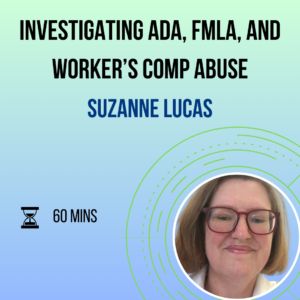Marketing and Empathy Psychology
FMLA Extension: When 12 Weeks Is Not Enough!
1.5 SHRM-approved credit
By - Margie Faulk
Lorem ipsum dolor sit amet, consectetur adipiscing elit. Ut elit tellus, luctus nec ullamcorper mattis, pulvinar dapibus leo.
- 06 Aug - 21 Oct 2022
- 10:00 - 12:00
- October 25, 2024 | Available all day |
- 90 Mins

The United States Department of Labor (“DOL”) released an opinion letter on February 9, 2023 (the “Letter”) clarifying covered leave for overtime-eligible employees under the Family and Medical Leave Act (“FMLA”) and the Americans with Disabilities Act (“ADA”).[1] The Letter pertains to FMLA-eligible employees who work more than 40 hours in a given workweek. The DOL explains that employees working in excess of 40 hours per week that qualify for reduced schedule leave under the FMLA may take such leave on an hour-by-hour basis. Although the same employees subject to overtime requirements may also request reduced schedule leave as a reasonable accommodation under the ADA, employers must separately analyze such leave under both the FMLA and ADA.
Many Employers are confused about what to do if an employee requests additional leave to manage their illness or their family member’s illnesses. Should Employers extend the unpaid leave on a case by case basis or should they limit those decisions across the board. Additionally, when does the ADA supersede FMLA? Is there reasonable accommodations that can be offered? Does the Employer risk violations when making these decisions?
It is important if not critical for Employers to have an in-depth understanding of the Family Medical Leave Act (FMLA) impacts their company. The ability to manage the idiosyncrasies of the processing of FMLA and how one processing failure can result in thousands of dollars in fines & penalties, auditing by the Department of Labor (DOL), cost of investigations, loss productivity and the cost of misuse by employees. In addition, statistics shows that over 61% of Employers have difficulty managing FMLA leave and intermittent leave.
In February 2023, the DOL published Field Assistance Bulletin (FAB) No. 2023-1, which confirms that employees who work remotely are eligible for FMLA leave on the same basis as onsite employees.
The bulletin specifies that a remote employee’s workday starts when they begin their first “principal activity” and ends when they cease to perform it.
To be eligible, a worker must be employed at a worksite where 50 or more employees work within a 75-mile radius.
Why You Should Attend?
Based on these missteps that costs Employers so much and impacts their day to day operations to navigate this process, Employers need to have an understanding of the FMLA and other leave mandates, and develop a fool proof process to mitigate these and other workplace compliance regulations.
No one promises (or shouldn’t promise) that any webinar will make an Employer and expert in FMLA compliance but with an efficient process, effective training for managers and HR professionals, checklists and tools that can reduce risk, after taking this comprehensive training, Employers will be able to mitigate the risk and get back to running your business successfully.
Agenda:
- Learn if FMLA extension requests part of reasonable accommodations
- Learn what changes and updates are part of FMLA
- Learn what regulatory agencies enforce FMLA processing and how you can protect yourself from being a target
- Learn how preparing your managers with compliance training can reduce your risk for high penalties as a good faith effort from FMLA violations
- Learn why Employers are at risk for FMLA allegations even when employees don’t ask for FMLA
- Learn how the state paid leave programs interact with FMLA
- Do Holidays Count Against an Employee’s FMLA Leave Entitlement?
- Learn if Remote Employees Are FMLA Eligible
- What are the challenges with employees on FMLA leave who do not pay for their benefits?
- Is extended leave part of the ADA reasonable accommodations requirements?
- How can the DOL assist with FMLA extensions?
- How do Employer policies impact decisions of FMLA extensions?
- How can Employers protect themselves against FMLA retaliation when deciding to not extend FMLA for employees?
- What is the best way to accommodate employees without impacting your company?
- How does the DOL manage FMLA extension requests?
- How should HR professionals manage FMLA extension requests?
- What about third-party administrators (TPA) if you outsource your FMLA Administration?
- How does the ADA regulate decisions about reasonable accommodation requests?
- What policy will decrease your risk when you integrate it with you Employee Handbook?
- What if you need to terminate an employee after they complete their 12-week FMLA Leave?
- How can the Employer protect themselves from hard decisions in rejecting FMLA extension requests?
Who Should Attend?
- All Employers that have 50 employees
- Business Owners that have 40+ employees should prepare for FMLA eligibility
- Company Leadership
- Compliance professionals
- HR Professionals
Vulputate eros arcu magnis donec sem pretium scelerisque a etiam. Eros aliquam elit si mattis phasellus at orci letius ligula posuere. Sodales maecenas facilisis diam egestas dictumst si fames mus fermentum conubia curabitur. Ornare nisi consectetur semper justo faucibus eget erat velit rhoncus morbi.
Speaker Detail

Margie Faulk
Margie Faulk, PHR, SHRM-CP is a senior level human resources professional with over 14 years of HR management and compliance experience. A former Compliance Officer for Federal Defense Contracting Industry, Margie has worked as an HR and Compliance advisor for major corporations and small businesses in the small, large, private, public and Non-profit sectors. Margie is bilingual (Spanish) fluent and Bi-cultural. Margie’s focus is on multi-state, national, state and local workplace compliance. Additionally, Margie is working on International compliance initiatives globally which includes workplace compliance in other countries like the UK, Canada, France, Brazil, China, Africa, Mexico and India, just to name a few. Margie has created and presented seminars/webinars for many compliance institutes. These national training providers, offer compliance training to professionals, business owners and companies interested in having their company compliant with workplace and industry regulations. Margie holds professional human resources certification (PHR) from the HR Certification Institution (HRCI) and SHRM-CP certification from Society for Human Resources Management. Margie has completed the Certified Compliance and Ethics Professional training and is a member of the Society of Corporate Compliance & Ethics (SCCE).
Webinar Information
- Duration : 90 Mins
- Date: October 25, 2024 | Available all day
- 06 Aug - 21 Oct 2022
- 10:00 - 12:00
- Jakarta, Indonesia
Share this event
Related products
-

Investigating ADA, FMLA, and Worker’s Comp Abuse
$199.00 – $349.00 Select options -

How to Use ChatGPT for Business
$199.00 – $349.00 Select options -

Payroll IRS Form Review
$199.00 – $349.00 Select options -

From Crisis to Care: Nurturing Mental Health at Work to Empower Your Team
$199.00 – $349.00 Select options



